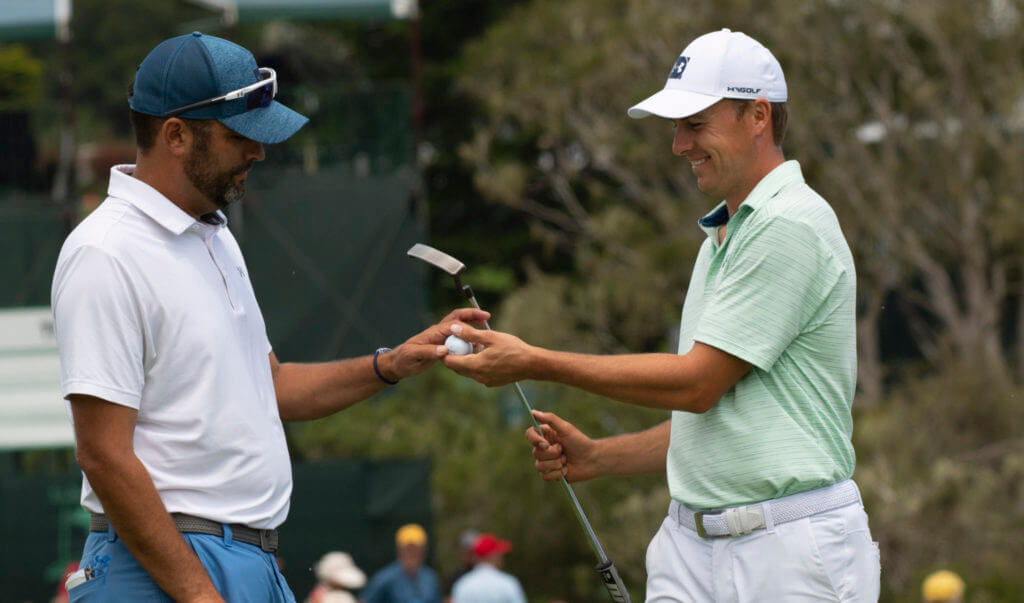
The best professional tour caddies know what to say to their professional golfer, when to say it and when it’s best to say nothing at all. Often, in the high stress arena of a major championship, when a players’ temperament is tested and their attitude can become either an asset or a liability, less is more.
On the eighth fairway Thursday at Pebble Beach, in the first round of the U.S. Open, less was more for Jordan Spieth’s caddie Michael Greller. After the duo made consecutive strategic miscues on the iconic par 4, Spieth vented his frustration for all the golf viewing world to hear.
“Two perfect shots, Michael,” Spieth said. “You got me in the water on one and over the green on the other.”
RELATED: Jordan Spieth explains words to caddie Michael Greller as ‘frustration, not blame’
Greller listened as Spieth spoke. The errors were obvious. Spieth hit a solid tee shot on a hole where every player in the field lays up with a fairway wood or long iron. The ball went too far, over the cliff and into the hazard. As club decisions go, it’s like turning on your laptop and seeing the blue screen. Spieth’s approach shot landed over the eighth green, which is a definite no-no. (He got up-and-down for bogey because that’s what three-time major champions do).
Spieth said his piece. The social media world erupted.
Folks should relax.
This is just another part of the player-caddie relationship. After being on the receiving end of a fair share of tongue-lashings, some of which I may have actually deserved, during 150 or so professional tournaments on the bag, I began to reflect, seeking clarity if not solace perhaps sympathy too.
I came to some conclusions.
Breaking news, golf is hard. Players vent to protect their most valuable asset — confidence. It’s why the old joke is kinda funny. First, the pro changes his driver, then he changes his putter, then he changes his caddie.
“It is not my fault!”
Professional golf is a high-stakes affair. In a major championship every decision and every shot are magnified. On a course as demanding as Pebble Beach, the slightest miscue can lead to an automatic dropped shot or two. The conditions were downright docile on Thursday and still the best players in the world struggled to hit greens in regulation.
When a pro strikes a solid shot — the part he can control — he expects a good result. When the shot turns out poorly because of a decision that was made in tandem with his caddie, guess who’s going to hear about it?
“When you hit a couple of shots exactly where you want and one’s in the water and the next one’s dead over the green, I’m going to be frustrated that as a team we didn’t figure out how to make sure that didn’t happen,” Spieth said after the round. “I may have looked like the bad guy, but my intentions were that we should be in play if the ball is hit solidly.”
That’s fair enough. In the heat of releasing steam, Spieth said ‘you’ rather than ‘we.’ Twitter was not happy.
Again, I say big deal.
Also keep in mind they’ve won more than $39 million together.
Caddies are as competitive as pros, sometimes more-so. I don’t know Greller other than he’s one of the best in the business. But I feel certain he at least shared the responsibility for the poor decisions. Because he’s one of the best in the business he chose not to interact with a boss who was running hot. After the round a reporter asked Greller about the exchange. He said he didn’t remember it, which was also brilliant.
Inside-the-ropes, once the decision has been made and the ball has been struck, that golf shot is history. There’s no time to hold grudges or let disputes fester. Caddies ask pros to remain in the present and move on to the next shot whatever the outcome. Sometimes the same advice applies to the man on the bag. For the record, Spieth played the last 10 holes even par on Thursday, keeping his cool and staying within firing range of the leaderboard.
I once heard it said that the best way to keep a good bag on the PGA Tour is to be right when the player asks for information or advice. The best way to keep that bag a little longer is to have thick skin on the rare occasion you are wrong. This is a big boy job shepherding around ultra-competitive athletes who are trying to perfect an imperfect game. Avoiding extreme highs and lows is imperative.
Sometimes a silent stroll, 150 yards down a hill to a green perched on a cliff overlooking a beautiful cove is the appropriate answer for that time.